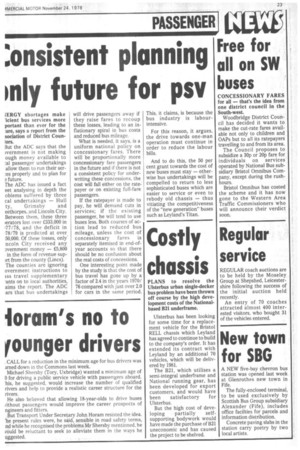:onsistent planning Inly future for psv
Page 25

If you've noticed an error in this article please click here to report it so we can fix it.
IERGY shortages make 'Went bus services more portant than ever for the :ure, says a report from the sociation of District Counlors.
But the ADC says that the wernment is not making ough money available to al passenger undertakings allow them to run their ser:es properly and to plan for a future.
The ADC has issued a fact eet analysing in depth the oblems suffered by three cal undertakings — Hull ty, Grimsby and eethorpes, and Lincoln City. Between them, these three ierators lost over £333,000 in 77/78, and the deficit in 78/79 is predicted at over 50,000. Of these losses, only ncoln City received any Dvernment money — £5,800 in the form of revenue supit from the county (Lines). The counties are ignoring overnment instructions to iss travel supplementary -ants on to local authorities, aims the report. The ADC ars that bus undertakings will drive passengers away if they raise fares to recoup these losses, leading to an inflationary spiral in bus costs and reduced bus mileage.
What is needed, it says, is a uniform national policy on concessionary fares. There will be proportionally more concessionary fare passengers in the future and if there is not a consistent policy for underwriting these concessions, the cost will fall either on the ratepayer or on existing full-fare passengers.
If the ratepayer is made to pay, he will demand cuts in services; if the existing passenger, he will tend to use buses less. Both courses of action lead to reduced bus mileage, unless the cost of concessionary fares is separately itemised in end-ofyear accounts so that there should be no confusion about the real costs of concessions.
One interesting point made by the study is that the cost of bus travel has gone up by a factor of 2.4 in the years 1970/ 76 compared with just over 2.0 for cars in the same period. This, it claims, is because the bus industry is labourintensive.
For this reason, it argues, the drive towards one-man operation must continue in order to reduce the labour bills.
And to do this, the 50 per cent grant towards the cost of new buses must stay — otherwise bus undertakings will be compelled to return to less sophisticated buses which are easier to service or even to rebody old chassis — thus vitiating the competitiveness of the "new generation" buses such as Leyland's Titan.




















































































































